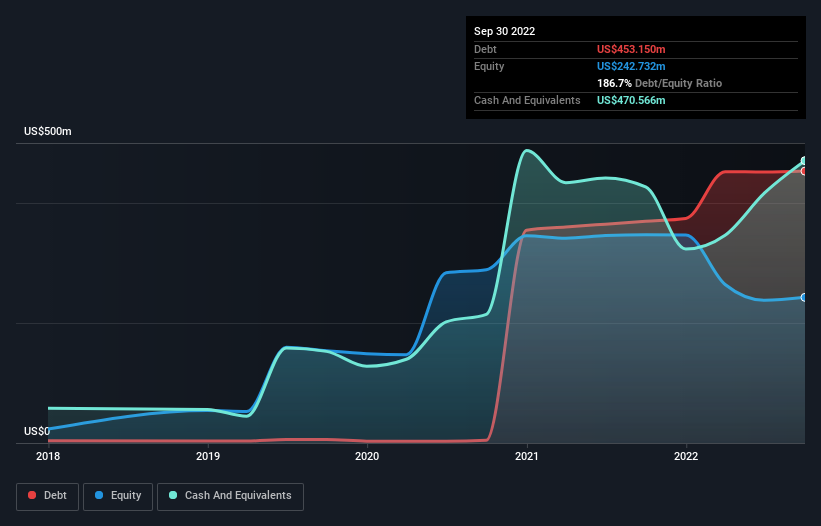- United States
- /
- Professional Services
- /
- NYSE:FVRR
Is Fiverr International (NYSE:FVRR) Using Debt In A Risky Way?

Legendary fund manager Li Lu (who Charlie Munger backed) once said, 'The biggest investment risk is not the volatility of prices, but whether you will suffer a permanent loss of capital.' So it seems the smart money knows that debt - which is usually involved in bankruptcies - is a very important factor, when you assess how risky a company is. As with many other companies Fiverr International Ltd. (NYSE:FVRR) makes use of debt. But the real question is whether this debt is making the company risky.
Why Does Debt Bring Risk?
Generally speaking, debt only becomes a real problem when a company can't easily pay it off, either by raising capital or with its own cash flow. Ultimately, if the company can't fulfill its legal obligations to repay debt, shareholders could walk away with nothing. However, a more usual (but still expensive) situation is where a company must dilute shareholders at a cheap share price simply to get debt under control. Of course, plenty of companies use debt to fund growth, without any negative consequences. When we think about a company's use of debt, we first look at cash and debt together.
See our latest analysis for Fiverr International
What Is Fiverr International's Net Debt?
The image below, which you can click on for greater detail, shows that at September 2022 Fiverr International had debt of US$453.2m, up from US$369.7m in one year. But it also has US$470.6m in cash to offset that, meaning it has US$17.4m net cash.

A Look At Fiverr International's Liabilities
According to the last reported balance sheet, Fiverr International had liabilities of US$213.4m due within 12 months, and liabilities of US$460.3m due beyond 12 months. Offsetting these obligations, it had cash of US$470.6m as well as receivables valued at US$18.5m due within 12 months. So its liabilities total US$184.6m more than the combination of its cash and short-term receivables.
Since publicly traded Fiverr International shares are worth a total of US$1.27b, it seems unlikely that this level of liabilities would be a major threat. Having said that, it's clear that we should continue to monitor its balance sheet, lest it change for the worse. Despite its noteworthy liabilities, Fiverr International boasts net cash, so it's fair to say it does not have a heavy debt load! There's no doubt that we learn most about debt from the balance sheet. But ultimately the future profitability of the business will decide if Fiverr International can strengthen its balance sheet over time. So if you're focused on the future you can check out this free report showing analyst profit forecasts.
In the last year Fiverr International wasn't profitable at an EBIT level, but managed to grow its revenue by 22%, to US$334m. Shareholders probably have their fingers crossed that it can grow its way to profits.
So How Risky Is Fiverr International?
Although Fiverr International had an earnings before interest and tax (EBIT) loss over the last twelve months, it generated positive free cash flow of US$26m. So although it is loss-making, it doesn't seem to have too much near-term balance sheet risk, keeping in mind the net cash. The good news for Fiverr International shareholders is that its revenue growth is strong, making it easier to raise capital if need be. But we still think it's somewhat risky. There's no doubt that we learn most about debt from the balance sheet. However, not all investment risk resides within the balance sheet - far from it. To that end, you should be aware of the 1 warning sign we've spotted with Fiverr International .
If you're interested in investing in businesses that can grow profits without the burden of debt, then check out this free list of growing businesses that have net cash on the balance sheet.
New: AI Stock Screener & Alerts
Our new AI Stock Screener scans the market every day to uncover opportunities.
• Dividend Powerhouses (3%+ Yield)
• Undervalued Small Caps with Insider Buying
• High growth Tech and AI Companies
Or build your own from over 50 metrics.
Have feedback on this article? Concerned about the content? Get in touch with us directly. Alternatively, email editorial-team (at) simplywallst.com.
This article by Simply Wall St is general in nature. We provide commentary based on historical data and analyst forecasts only using an unbiased methodology and our articles are not intended to be financial advice. It does not constitute a recommendation to buy or sell any stock, and does not take account of your objectives, or your financial situation. We aim to bring you long-term focused analysis driven by fundamental data. Note that our analysis may not factor in the latest price-sensitive company announcements or qualitative material. Simply Wall St has no position in any stocks mentioned.
About NYSE:FVRR
High growth potential with acceptable track record.


